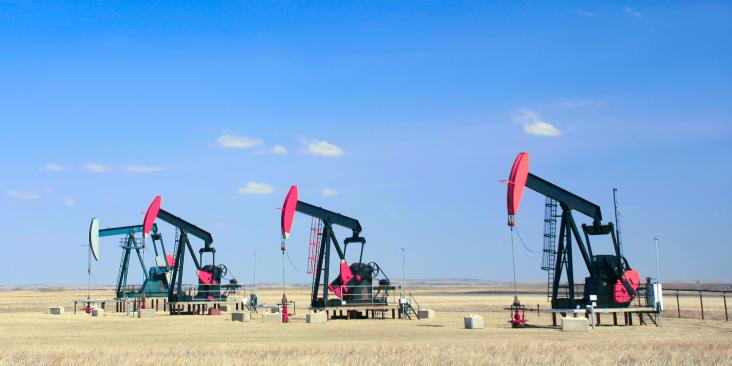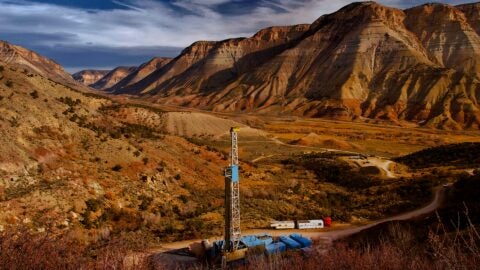EDF and ExxonMobil discuss technology and regulation to reduce methane emissions
 Since 2017, ExxonMobil has expanded its U.S. methane leak detection program, committed to its first global methane target, supported methane monitoring technology innovation and encouraged the U.S. Environmental Protection Agency (EPA) to regulate methane emissions at new and existing sources. Although Environmental Defense Fund (EDF) and ExxonMobil are not always aligned on certain important issues, the organizations are working together to understand and reduce methane emissions. Ben Ratner, senior director with EDF+Business, sat down with Matt Kolesar, regulatory manager at ExxonMobil’s XTO Energy affiliate, to discuss the company’s perspective on why methane is such a key issue for the industry and how technology and regulation can accelerate industry’s progress.
Since 2017, ExxonMobil has expanded its U.S. methane leak detection program, committed to its first global methane target, supported methane monitoring technology innovation and encouraged the U.S. Environmental Protection Agency (EPA) to regulate methane emissions at new and existing sources. Although Environmental Defense Fund (EDF) and ExxonMobil are not always aligned on certain important issues, the organizations are working together to understand and reduce methane emissions. Ben Ratner, senior director with EDF+Business, sat down with Matt Kolesar, regulatory manager at ExxonMobil’s XTO Energy affiliate, to discuss the company’s perspective on why methane is such a key issue for the industry and how technology and regulation can accelerate industry’s progress.
Ben: It’s been a busy couple of years for ExxonMobil ramping up its commitments and positions on methane emissions. What are the benefits to industry of minimizing methane emissions?
Matt: We are taking these actions because we see multiple benefits for society, our industry and the company.
First, we want to support the future role of natural gas by reducing the carbon-equivalent footprint of the fuel. The International Energy Agency projects natural gas playing an increasing role within the world’s future energy mix over the next 20 to 30 years. Natural gas burns cleaner and has greenhouse gas benefits over coal, and mitigating methane emissions further reduces greenhouse gas emissions.
Mitigating methane emissions helps meet societal, investor and customer expectations for cleaner energy. As the global population rises and economic development and prosperity expands, our view is that all viable energy sources will be needed to meet growing demand. Our challenge is to provide affordable energy supplies at the scales required, while addressing environmental concerns.
As a company in the business of selling natural gas, we also want to minimize waste of that natural resource for ourselves and our resource owners. It is in our economic interest to ensure our product is captured in the pipe and sold to consumers. We continually strive for increased efficiencies in our operations.
Finally, our employees as well as the next generation of employees are focused on minimizing our environmental footprint. Many of the operational efficiencies we have found in our efforts to further reduce methane emissions have come from the innovations our employees and researchers have identified. They are proud of the reductions we have made and are continuing to look for ways to further reduce our footprint. They believe it is the right thing to do.
EDF and ExxonMobil discuss technology and regulation to reduce methane emissions Share on XBen: In fall 2017, ExxonMobil’s U.S. upstream subsidiary XTO Energy announced an expanded program to detect and fix leaks at new and existing upstream and midstream facilities. Into the second year, what are you learning from your enhanced efforts in the field?
Matt: We’ve learned a lot. Quite frankly, some of it was expected and hoped for, but additional insights came to light.
Some of those insights are simple, such as how to optimize leak detection and repair strategies over wide geographic areas, and how to manage the vast amounts of data generated.
We are finding our leak and leak detection and repair programs to be effective. Just 18 months into our voluntary program we’ve achieved nearly a 40 percent decrease in observed leak frequency. Much of that decrease is due to what our field operators learned on effective maintenance practices, operational improvements and which equipment manufacturers perform best and moving to those applications.
We expect those improvement trends to continue as we further analyze the data and continue field operations. We are also looking at how we can incorporate learnings into future design considerations.
We are seeing that employee engagement is robust throughout the organization. Once we communicated the program to the organization, our employees have really taken on the challenge of continuing to find further methane reduction opportunities and efficiencies. While we have always had the work ethic to achieve operational excellence, this has been gratifying to see.
Ben: ExxonMobil supports technology innovation for methane management through the Oil and Gas Climate Initiative, collaboration with EDF and Stanford University, and independent projects. How do you see the potential for innovation?
Matt: We appreciate EDF’s foresight and action in support of technology development. Our first foray into the research area in terms of understanding unconventional wellsite emission profiles on the ground was the 2013 study led by Prof. David Allen at the University of Texas at Austin in coordination with EDF. Since then we have considerably expanded our research and development activities. We see big opportunities to deploy innovative strategies and technologies to monitor, measure and ultimately prevent emissions.
Technology can improve cost-effectiveness. The primary methane emissions mitigation approaches involve equipment upgrading and optical gas imaging leak detection and repair, both of which are resource and time intensive. There are a number of promising emerging technologies that may provide opportunities to enhance cost effectiveness of each option.
For example, mobile methane monitoring (unmanned aerial vehicles, trucks and satellite) technologies may dramatically improve the cost effectiveness of leak detection and repair. We have locations where our operations are fairly concentrated, but we also have many wells that are spread out across rural or mountainous areas.
Aerial deployment of sensors not only permits more rapid identification and location of leaks, it also quantifies the emissions on the horizon as the algorithms improve. As you know, today most reporting is based upon emission factors or assumptions per device, not real data. Identifying lower cost alternatives to intermittent and low-bleed pneumatic controllers may also provide more cost-effective emissions mitigation.
ExxonMobil has been working with EDF and others on demonstrating new technologies with a goal of accelerating broader deployment. We believe it is important for industry to work proactively with governments, academics and NGOs to pave the way for innovative technologies to be validated and, ultimately, used for regulatory compliance where governments have acted.
Ben: Even as your company has increased its voluntary efforts to reduce emissions, you have also emphasized the importance of government regulation. What do you see as the role of methane regulation, and why is it important to industry’s future?
Matt: The reasons behind our support for reasonable, cost-effective regulations are related to your first question. The benefits we see from methane emissions mitigation accrue more broadly when all of industry participates.
Government action through methane policy and regulation also has an important role to play in aligning incentives, leveling the playing field and ultimately helping industry as a whole rise to the challenge. As an original signatory to the Methane Guiding Principles, we are committed to working with governments and groups like yours in supporting the development and implementation of sound and effective methane rules.
With the experience we have gathered across our operations, we know how to reduce our methane emissions in a cost-effective manner. We support regulations that focus on reduction measures that have an impact in reducing emissions from operational components. Smart regulation that takes into account new and existing sources as well as their differences, allows industry to continue to thrive while resulting in environmental benefits.
Ben: With a discussion underway on the future of U.S. methane regulation, ExxonMobil recently became the first operator to publicly urge EPA to continue regulating methane emissions, including existing sources. Although EDF disagrees with ExxonMobil on certain aspects of regulatory design, your call for continued (and in some ways expanded) federal methane regulation represents much needed leadership. What is the benefit to industry of a nationwide methane regulatory approach?
Matt: In our view, a good EPA methane regulation can help by ensuring a clear federal standard versus a patchwork approach to state regulations. A federal regulation also helps build stakeholder confidence, and provides long-term certainty for industry planning and investment while achieving climate related goals.
As we explained in our written comments to the EPA, ExxonMobil strongly encourages the agency to continue regulating methane emissions at new and modified sources, and to expand methane regulation to existing sources.
The increase in U.S. oil and gas production is a unique opportunity for industry to help meet rising energy demand. Nationwide methane regulations are a key part of taking advantage of that opportunity responsibly and competitively.
With the right mix of effective regulations with best management practices, plus voluntary actions that push the frontier of innovation, we can help the U.S. reduce its carbon footprint.












